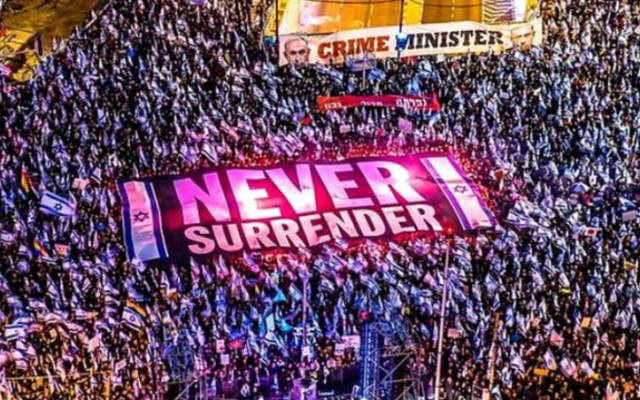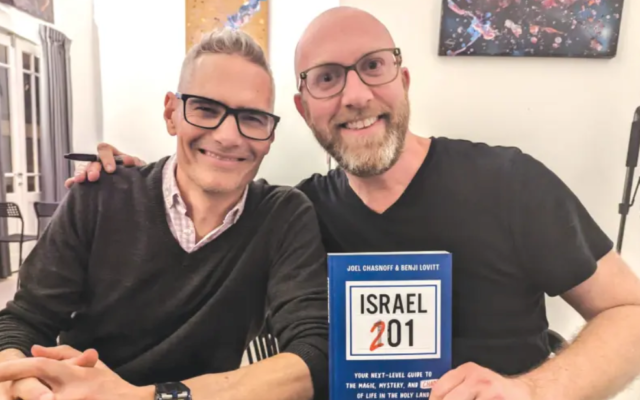‘Israeli 201’ Demystifies Everyday Life in Israel
New book by two American-born Israelis aims to introduce us to all that we didn’t know or understand about life in Israel.

Israeli comedians Joel Chasnoff and Benji Lovitt both first moved to Israel 20 years ago from Chicago and Dallas, respectively. Over the years, they’ve gained a unique perspective about everyday life in the Jewish State. This month, Gefen Publishing released “Israel 201,” which, as its title would suggest, is an introduction to Israel for those who already know the basics. The AJT spoke to them just before their Shabbat program on March 10-11 at Temple Sinai in Sandy Springs.
Bahr: Why write this book?
Chasnoff: Our goal was to not write a book about the usual narratives, which is war, conflict, occupation, or startup nation technology. But to write about all those little pockets of life that make it magical and wonderful and also chaotic, that people would understand the country in a comprehensive way, not just for what they see on CNN.
Bahr: How has your career as comedians influenced what you wrote about Israel?
Lovitt: I think we’re fair. We’re not angry, ranting comedians. We make fun of others, but we make fun of ourselves. And I think, as immigrants, we have the ability to make fun of Israel, but also realize that we make fun of ourselves.
Chasnoff: The best comedians are great observers. They look at life…and they pay attention to the contradictions. And then, they make their humor out of (it). In our book, we’re finding all of those little nuances of Israeli life that make it different and special. Sometimes, it leads to a humor, but sometimes, it just leads to pointing out a really astute observation.

Bahr: What do you think it is that Americans don’t understand about Israel?
Chasnoff: I think most American Jews and America, in general, are not aware of how economically difficult it is just to survive on a month-to-month basis in Israel. The salaries are low, the day-to-day expenses are very high. And I think that they don’t quite realize here how much Israeli life centers on just surviving economically and how that influences politics, too.
I think a second thing they don’t understand is how much interaction there is between Jews and Arabs. I think there’s this notion that there’s two separate peoples who need to find a way to coexist. The reality is there is a lot more coexistence than people realize. It’s actually quite beautiful, and I think it’s hopeful. There’s no such thing as going a day in Israel where you will not interact at some point with an Arab-Israeli as well, if you’re Jewish, Israeli, and vice versa. And I think if people were aware that that happened, they might be more hopeful and see the country differently.
I think the third area where they might not be fully clear is just how complicated the political system is. I think it’s easy to look from the outside and say, ‘Oh, they have all these parties.’ And so, it’s different from the American system. I don’t think Americans quite realize how messy it gets. And the amount of deal-making and bartering that needs to go into just forming a government has a large influence on why Israel is the way it is.
Bahr: How do you account for the fact that you live in a Jewish state and 80 percent of the people there say they aren’t religious?
Lovitt: In America, we have our American — our national identity as Americans — and our religious identity as Jews. And in Israel, those are fused together. And many Israelis don’t even know until they come abroad to distinguish between the two. Why do they light the candles? Because they’re Israeli. Why do they suffer? Because they’re Israeli. It doesn’t occur to them that they’re Jewish.
Chasnoff: I think one of the best things happening in the Jewish world now is Israelis who are out of the army coming to work at summer camps in America because they get a taste for the first time that Judaism doesn’t have to be the way it is in Israel. It doesn’t have to be Orthodox or nothing. I think we should send Israelis abroad so that they can see what Judaism is like elsewhere and then bring some of that home.

Bahr: Hundreds of thousands of Israelis have taken to the streets in recent weeks to protest the direction the new government has taken. Is Israel falling apart?
Chasnoff: While those demonstrations were going on, there were other people who are going to Purim parties dressed in costumes and kids were playing basketball at the courts nearby. And if I were to open a newspaper and read what’s going on in America, I would not see the normal conversations that people are having and the jokes that friends are sharing between ourselves.
You know, news is designed to grab the most scintillating aspects of any society. And to only pay attention to that would give you the wrong impression of what daily life is like. That’s why we wrote this book, to show you daily life, and that’s why we want people to come to Israel. Nothing will change your mind more than a two-week trip here to see what the country is like.
That said, is the country falling apart? Most people do think it will survive. They don’t know how. But we don’t have a choice. So, it must.



comments